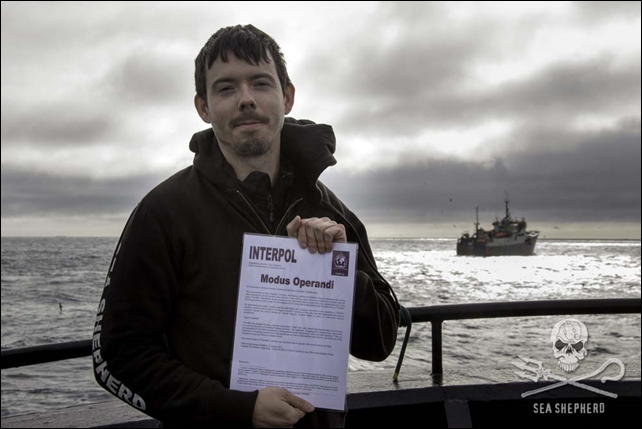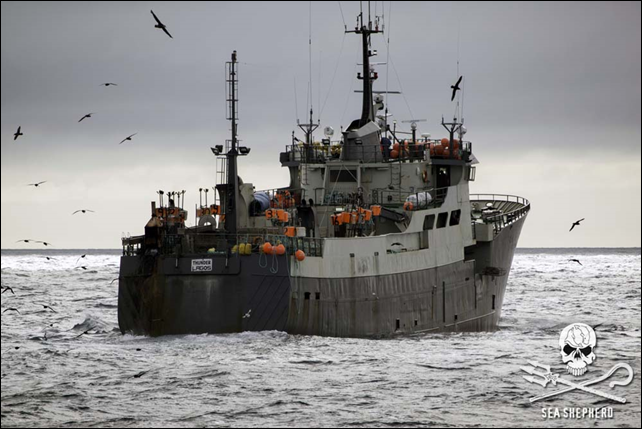Notorious pirate fishing vessel in Southern Ocean flees activists – ‘Many layers of deliberate concealment of ownerships and profits protect these illegal operations’
By Andrew Darby
4 January 2015 (The Age) – Abandoned gillnets up to 25 kilometres long, banned in the Antarctic, have been seized as a notorious pirate fishing boat tries to shake a marathon pursuit with Australian Sea Shepherd boats. Prized “white gold” toothfish have been recovered with countless other fish and crabs from one of the nets by Sea Shepherd crew, who are hauling a second net. The pirate fishing vessel Thunder, said by Interpol to have reaped tens of millions of dollars worth of toothfish, was detected near the first net at Banzare Bank, south-west of Perth, on 17 December, and sped away. Melbourne-based Sea Shepherd ship Bob Barker chased it, while volunteer crew on another of the group’s vessel’s, Sam Simon, also based in Melbourne, hauled the nets in freezing polar conditions. “They have tried to lose us in heavy ice and in heavy seas,” said Bob Barker’s skipper, Peter Hammarstedt. “Their strategy now seems to be to try and wait us out,” Mr Hammarstedt said. “They are doing minimum speeds to conserve fuel.” The Nigerian-flagged Thunder, which has used a series of names and different national flags, has been pursued by the Australian government and is subject to an Interpol probe. “It is possible that the owners of Thunder have earned more than $US60 million from its illegal fishing activities since it was blacklisted by the Commission for the Conservation of Antarctic Marine Living Resources (CCAMLR) in February 2006,” Interpol said in a statement. CCAMLR has forbidden the use of the “wall of death” vertical gillnets in the Antarctic because of their indiscriminate killing. Sam Simon’s skipper, Sid Chakravarty, said around 250 toothfish were found dead in the first net, the largest fish 1.6 metres long, while some were egg-carrying females. Non-target species including rays, jellyfish, and a “staggering” number of grenadier fish were also killed, but most crabs caught were still alive, and released back into the Southern Ocean. The second net was so far yielding more, Mr Chakravarty said. “The large number of dead animals that we have documented is proof of the widespread destruction that the Thunder has wreaked over its decade-long onslaught on the Southern Ocean,” he said. Sea Shepherd is reporting its evidence to Interpol, CCAMLR, and the Australian Fisheries Management Authority (AFMA). “The onus is now on the relevant international authorities to use this evidence to prosecute the Thunder,” Mr Chakravarty said. [more]
Pirate’s haul of ‘white gold’ reveals cost of illegal fishing 
By Captain Paul Watson
4 January 2015 (Facebook) – It’s not easy doing Ocean Conservation work. Sea Shepherd is up against powerful economic and political forces with subsidies and the law supporting illegal activities. The chasing of the Nigerian flagged poacher Thunder by the Bob Barker and the confiscation of two illegally set gill nets set by the Thunder by the Sam Simon have been reported today in The Age (Australia) in an article by Andrew Darby. Despite the fact that the Coalition of Legal Toothfish Operators (COLTO) has supported the intervention by Sea Shepherd, the Commission for the Conservation of Antarctic Marine Living Resources (CCAMLR) has been hostile with executive secretary Andrew Wright saying that he expects the “legitimacy” of the operations of both the Thunder, and of Sea Shepherd, to be discussed by the organization’s 25 member nations. It is ironic that Sea Shepherd’s actions are being supported by fishermen and criticized by conservationists. There have been serious discussions in the media by “experts” saying how Sea Shepherd could be charged with illegal fishing for pulling up the nets or Sea Shepherd could be sued for interfering with the profits of the poaching operations by the Thunder. When Sea Shepherd intervened against the illegal taking of Bluefin tuna by a Maltese fishing corporation off the coast of Libya in 2011, the company launched a civil suit against Sea Shepherd in the British courts which has still not been decided. A lawyer for the company stated that they would defeat Sea Shepherd by throwing money at Sea Shepherd until Sea Shepherd was destroyed. Sea Shepherd won in the lower court but the company called Fish and Fish won in the Appeal Court and now it is awaiting a decision by the Supreme Court in Britain. The Japanese received an injunction in 2012 from the U.S. Federal 9th Circuit Court ordering Sea Shepherd USA to not approach within 500 yards of any Japanese whaling vessel. Sea Shepherd USA complied with the injunction with the Southern Ocean campaigns continuing under the leadership of Sea Shepherd Australia. Despite this, Sea Shepherd USA was charged with violating the injunction by not controlling Sea Shepherd Australia’s activities, something Sea Shepherd USA has never had any power to do. This injunction remains in force despite the Japanese whaling fleet being found by the International Court of Justice to be illegal. The Japanese whalers continue to operate with huge subsidies from the Japanese government including 30 million U.S. allocated from the Tsunami Relief Fund and given to the whaling industry. And now we are finding that some of the toothfish poachers are receiving millions of Euros in subsidies through Spanish fishing companies based in Galicia. What we are finding is that there are many layers of deliberate concealment of ownerships and profits protecting these illegal operations and with profits of tens of millions of dollars or Euros they simply defend themselves with a small army of lawyers churning out punishing civil suits. The Thunder was detained in Malaysia last year after a joint operation by Indonesia, Malaysia, and Australia. It was released with its catch after paying a fine of $90,000 Australia dollars, a fraction of the $60 million in fish the Thunder is though to have robbed from the ocean to date. Vested interests are angry now. Not only has Sea Shepherd deprived the Thunder of its illegal catch, it has confiscated more than twenty tons of gill net and this intervention will cost the owners of the Thunder much more than the paltry $90,000 fine they paid to the Malaysians last year. The Thunder is still trying to find a port of refuge. They were heading to Maputo in Mozambique but Sea Shepherd informed the Mozambique authorities and it appears that the Thunder has decided to not go to Mozambique. The ship is not going anywhere at all. It is moving at about 2 knots some 1200 miles south of South Africa. The pursuit of the Thunder by the Bob Barker is now entering the 18th day. Meanwhile down on the Banzare Bank, the crew of the Sam Simon continue the arduous task of hauling in kilometer after kilometer of illegal gill net in freezing conditions thousands of miles from any port. And as they do, the people who are charged with protecting Antarctic Marine Resources are discussing if Sea Shepherd’s efforts are “legitimate.” But as the “experts” continue to talk, the crews on both Sea Shepherd ships continue to act.
The World of Money, Poaching, Subsidies, and the Law.
